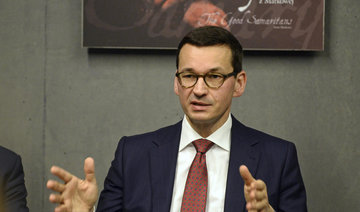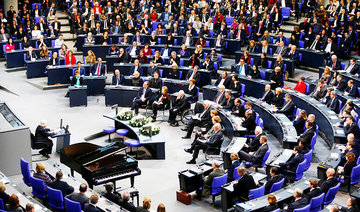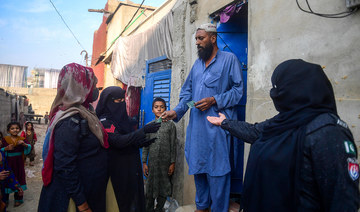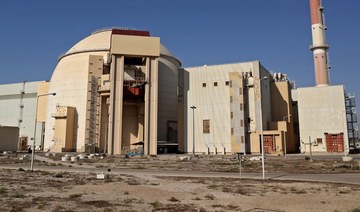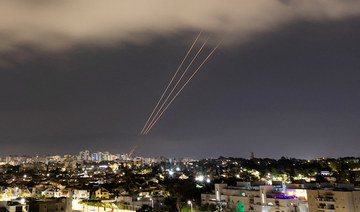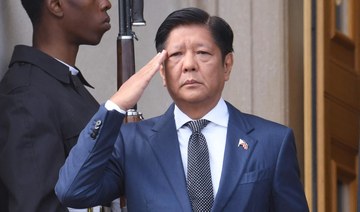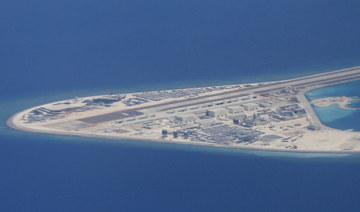WARSAW: President Andrzej Duda on Tuesday signed into law a controversial Holocaust bill intended to safeguard Poland’s image abroad but which has instead triggered an unprecedented diplomatic row with Israel and tensions with the US and Ukraine.
Duda also said he would send the legislation, which now comes into force, to the Constitutional Tribunal to rule on whether it conforms with guarantees for freedom of speech.
The law sets fines or a maximum three-year jail term for anyone ascribing “responsibility or co-responsibility to the Polish nation or state for crimes committed by the German Third Reich — or other crimes against humanity and war crimes.”
The main aim is to prevent people from erroneously describing Nazi German death camps such as Auschwitz-Birkenau as Polish, simply due to their geographical location.
Israel has expressed deep concerns that the legislation could open the door to prosecuting Holocaust survivors for their testimony should it concern the involvement of individual Poles for allegedly killing or giving up Jews to the Germans.
But Duda and other Polish leaders insist the law does not limit freedom of speech on Holocaust issues that are based in historical fact.
“I have decided to sign the law but also to send it to the Constitutional Tribunal,” Duda told reporters in Warsaw on Tuesday.
He said the decision “preserves the interests of Poland, our dignity and the historical truth” and also “takes into account the sensitivity of those for whom the question of historical memory of the Holocaust remains exceptionally important, especially those who have survived and who, as long as they can, should tell the world about this past and their experience.”
Israel said Tuesday it still hoped that “we will manage to agree on changes and corrections,” adding that it “continues to communicate with the Polish authorities.”
Prime Minister Benjamin Netanyahu declared last week Israel had “no tolerance for the distortion of the truth and rewriting history or denying the Holocaust.”
Israel’s Ambassador to Poland Anna Azari said Monday that after Poland’s Senate adopted the bill last Thursday she “had signals” she may be withdrawn.
Analysts say that the legislation has isolated Poland from Israel, a key ally of the United States and neighboring Ukraine.
The US State Department warned last week that the bill could have “repercussions” on “Poland’s strategic interests and relationships — including with the United States and Israel.”
According to Polish security analyst Grzegorz Kostrzewa-Zorbas the statement was the “strongest” made by the US toward Poland since the Cold War.
He told the Gazeta Wyborcza daily the tensions could potentially affect Warsaw’s talks with the US on an unprecedented multi-billion dollar defense purchase of a US-made Patriot anti-missile defense system.
Prime Minister Mateusz Morawiecki has described the tensions as a “temporary weakening of relations with Israel and the USA” but added that he hoped for an improvement soon after Poland explained its position.
Foreign Minister Jacek Czaputowicz said Monday that Poland was open to amending the law but insisted that Israel’s criticism was “due to a misunderstanding” and “over-interpretation.”
Jewish organizations from across the globe have also expressed deep concern.
European Jewish Association Chairman Rabbi Menachem Margolin said in a statement Tuesday his organization would challenge what he described as the “flawed” law in Poland’s Constitutional Tribunal.
“It seems inconceivable that an EU member state can be permitted to whitewash history by imposing draconian legislation that can imprison people for holding an alternative view on what happened during Europe’s darkest days,” Margolin added.
Ukraine has also slammed the law with President Petro Poroshenko protesting against “absolutely biased and categorically unacceptable” articles that allow for the prosecution of anyone denying the crimes of Ukrainian nationalists committed between 1925 and 1950.
Germany’s Foreign Minister Sigmar Gabriel said “there is not the slightest doubt about who is responsible for the extermination camps, who made them work to kill millions of European Jews: namely the Germans.
“It was our country that organized these mass murders and no one else. The existence of certain collaborators does not change anything,” Gabriel said.
“Poland can be certain that any distortion of history such as the notion of ‘Polish concentration camps’ will be clearly rejected and firmly condemned.”
Poland’s president signs controversial Holocaust bill into law
Poland’s president signs controversial Holocaust bill into law
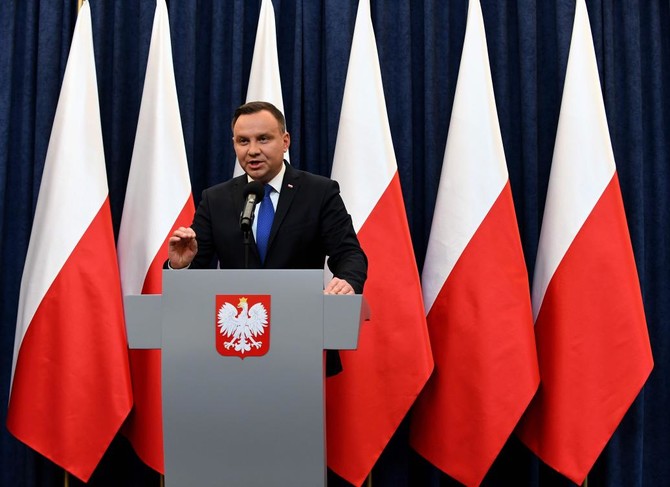
UK MPs vote down plan to protect Afghan ‘heroes’ from deportation
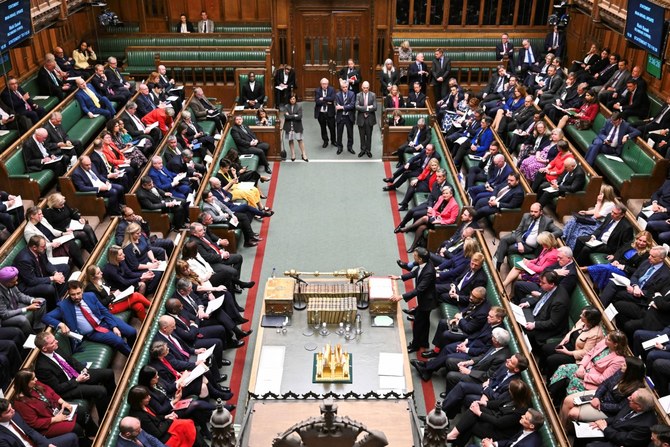
- 10B amendment seeks to exclude Afghan veterans from removal to Rwanda
- Top military officials warn of ‘grave damage to our ability to recruit local allies in future military operations’
London: Conservative MPs in the UK have voted against a plan to prevent Afghan veterans who served alongside British soldiers from facing deportation to Rwanda.
An amendment to the controversial Rwanda bill was overturned by 312 votes to 253 on Monday, in a rejection of plans to exempt agents, allies and employees of the UK from being deported to the African country, The Independent reported.
The House of Lords’ amendment 10B is part of the larger bill, which seeks the deportation of illegal migrants to Rwanda.
Several amendments set in the House of Lords have sought to prevent Afghan veterans who fought alongside the British military in the decade-long war from being included in deportation orders.
The 10B amendment included people eligible to enter the UK under the Afghan Relocations and Assistance Policy, which supports Afghans who helped the British campaign in their country and who are at risk under the Taliban government.
After the vote, the Rwanda bill will now return to the House of Lords for new scrutiny.
UK Prime Minister Rishi Sunak had told Conservative MPs to vote against all amendments to the bill, including 10B.
The move to exclude Afghan veterans from potential deportation to Rwanda has received support from the highest levels of Britain’s military establishment.
Thirteen senior military officials, two former chiefs of defense staff, a former defense secretary and a former UK ambassador to the US have supported the amendment.
The Sunday Telegraph carried a letter from top military officials ahead of Monday’s vote. They warned that a rejection of the amendment would cause “grave damage to our ability to recruit local allies in future military operations.”
The letter added: “It is essential that those who have made it to British shores are not unduly punished by being removed to Rwanda when the government’s scheme is up and running.”
India’s Lok Sabha election 2024: What you need to know
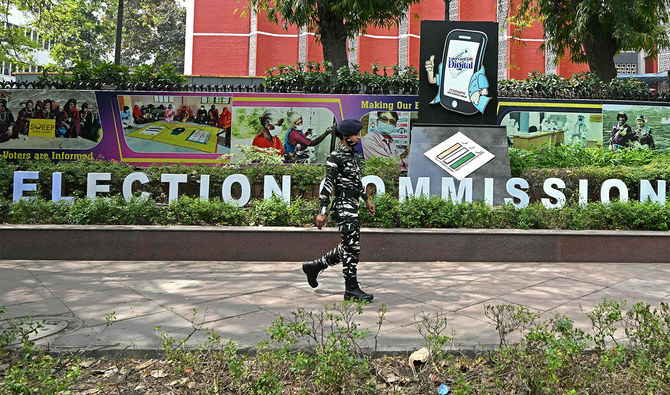
- India is holding the world’s biggest election starting this month, with nearly one billion people eligible to vote
- Votes to be counted on June 4 after polling done on April 19, April 26, May 7, May 13, May 20, May 25, June 1
India is holding the world’s biggest election starting this month, with nearly 1 billion people eligible to vote and Prime Minister Narendra Modi in the pole position.
WHAT IS IT?
Elections to the 543 contested seats in the lower house of parliament, called the Lok Sabha, for a term of five years. To rule, a party or a coalition needs a simple majority of 272 seats. Prime Minister Narendra Modi’s Bharatiya Janata Party (BJP) won 303 seats the last time, followed by 52 for the main opposition Indian National Congress (INC).
In addition to the contested seats, India’s president can nominate up to two Anglo-Indians to the Lok Sabha.
The Bharatiya Janata Party, BJP, won 303 seats in 2019 general election. The second largest party, the Indian National Congress, INC, won 52 seats. The Dravida Munnetra Kazhagam, DMK, emerged as the third largest party.
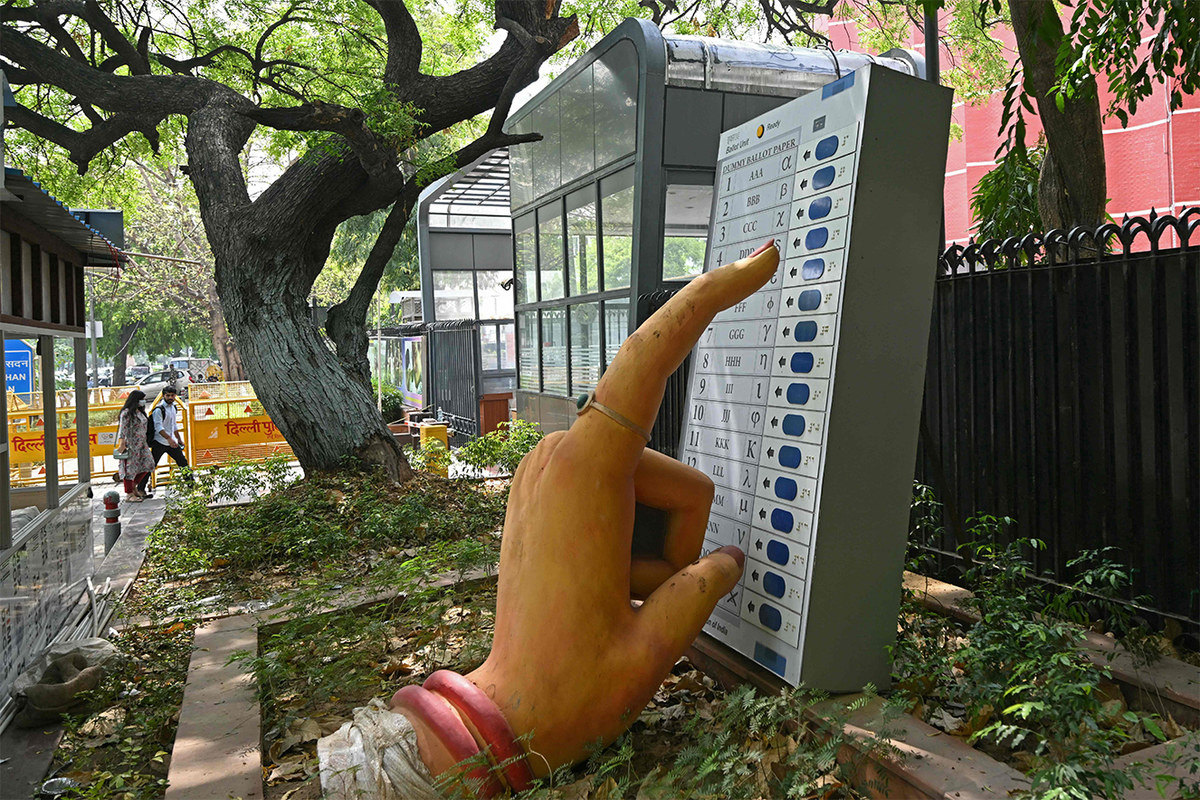
WHERE AND WHEN IS IT TAKING PLACE?
The elections will be conducted in seven phases partly to ensure sufficient security at polling booths across the vast country. Voters can make their choice by pressing a button on an electronic voting machine, first used in India in 1982 and more widely since the early 2000s.
Votes will be counted on June 4 after polling is done on April 19, April 26, May 7, May 13, May 20, May 25 and June 1.
The elections in the world’s largest democracy for 543 seats will be held in 7 phases.
HOW DOES IT WORK?
The world’s most populous nation follows the first-past-the-post system, where voters cast a vote for a single candidate in a constituency and the candidate with the most votes wins the seat. The voting age is 18 years and contestants need to be at least 25 years old.
A total of 968 million voters are registered, out of which 497 million are men and 471 million are women. A higher percentage of women voters than men are likely to vote for the second time in a row.
WHO ARE THE MAIN CANDIDATES?
Modi headlines the race, followed by his de facto deputy Amit Shah and the main opposition face, Rahul Gandhi of the Congress party. Gandhi’s mother Sonia, the matriarch of the Nehru-Gandhi dynasty, is not contesting this time.
WHY IS IT IMPORTANT?
Modi is chasing a record-equalling third straight term like India’s first prime minister, Jawaharlal Nehru. Modi says another overwhelming victory for the National Democratic Alliance, led by the BJP, is crucial to meet his goal of lifting India to a developed economy by 2047 from middle-income levels. The world’s fifth-largest economy has grown fast in the past few years and Modi has “guaranteed” to take it to the third position if he wins the election.
The BJP draws its support mainly from Hindus, who form 80 percent of the country’s 1.42 billion people and for whom Modi earlier this year delivered on a key party promise of building a grand Hindu temple on a disputed site.
The opposition “INDIA” alliance, largely a center-left grouping of more than two dozen disparate parties, says a victory for it is essential to save the country’s democratic and secular setup, lift its marginalized communities, raise prices for farmers and create jobs for its young. Opinion polls, which have a mixed record in India, predict another thrashing of the Congress alliance at the hands of the BJP.
US Treasury preparing new Iran sanctions after Israel attack, Axios reports
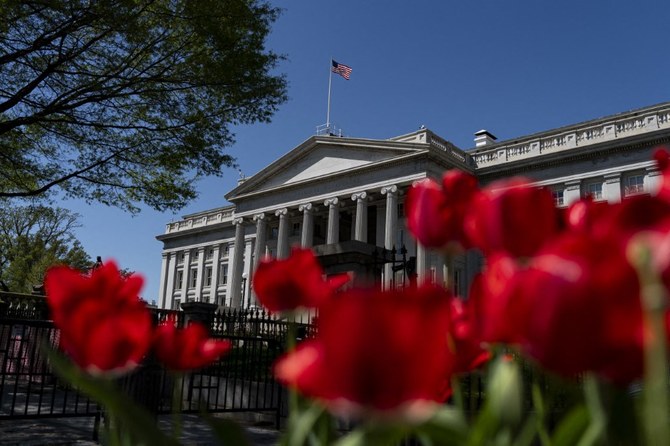
- Iran’s actions threatened stability in the Middle East and could cause economic spillovers
US Treasury Secretary Janet Yellen is preparing fresh sanctions on Iran in response to Iran’s attack on Israel, Axios reported on Tuesday, citing a copy of her remarks.
“Treasury will not hesitate to work with our allies to use our sanctions authority to continue disrupting the Iranian regime’s malign and destabilizing activity,” Yellen is prepared to say Tuesday, as per the Axios report.
“The attack by Iran and its proxies underscores the importance of Treasury’s work to use our economic tools to counter Iran’s malign activity,” she will further say, Axios reported.
Yellen said previously that Iran’s actions threatened stability in the Middle East and could cause economic spillovers, adding that the US would use sanctions and work with allies.
Afghanistan’s first female Olympian calls for Paris Games ban over Taliban’s rights record

- Friba Rezayee was 18 when she stepped onto the mat at 2004 Olympics in historic moment for her country
- Taliban say they respect women’s rights in line with their interpretation of Islamic law and local customs
GENEVA: Friba Rezayee, the first woman to represent Afghanistan at the Olympics, has been appalled by the treatment of women since the resurgence of the Taliban and is now campaigning for the country to be kept out of the Paris Games.
Rezayee, a judoka who competed at the 2004 Olympics in Athens, has called on the International Olympic Committee (IOC) to ban Afghanistan due to the Taliban’s human rights record. She has argued that under a such ban, Afghan women should still be allowed to participate as part of the IOC Refugee Olympic Team.
“Given tons and tons of evidence about the Taliban, about their brutal treatment of women and children, they are very dangerous,” Rezayee, who now lives in Vancouver, told Reuters.
“If the IOC allows them to enter the Olympics at the heart of Europe, in Paris in 2024, it’s very dangerous for the people.”
Zabihullah Mujahid, spokesman for the Taliban administration, declined to comment.
The Taliban — who say they respect women’s rights in line with their interpretation of Islamic law and local customs — have closed girls’ high schools and placed travel restrictions on women without a male guardian and restricted access to parks and gyms.
Asked to comment on Rezayee’s call, the IOC referred to a statement made last month by James Macleod, its Director of National Olympic Committee Relations and Olympic Solidarity.
Macleod said at the time that the IOC was in dialogue with Afghanistan’s National Olympic Committee (NOC) and sport authorities “with the aim to reverse the current restrictions on access to sport for women and young girls in Afghanistan.”
He said that although the IOC acknowledged different views on whether Afghanistan’s NOC should be suspended, it “doesn’t believe that isolation of the Afghan sporting community at this time is the right approach.”
Separately, the IOC said that athletes needed a refugee status confirmed by the United Nations refugee agency to be eligible for the IOC Refugee Olympic Team.
'STRONGER THAN MEN WITH GUNS'
Rezayee was 18 when she stepped onto the mat in Athens in a historic moment for her country. She was convinced her pioneering role would help advance women’s rights.
“I actually believed that we would only progress from here,” she said. “When I returned from Athens, I stayed in Afghanistan and I wanted to stay in Afghanistan. I continued my training because I saw the important changes it was making in every single girl’s life.”
But her hopes of seeing her countrywomen gain more rights were crushed when the Taliban seized power in August 2021.
“It feels like whatever I did to support women’s rights and gender equality back in 2004, it has been all undone by the IOC and by the Taliban and people who tolerate the Taliban,” Rezayee said.
In February, a United Nations expert described the Taliban’s disrespect for the rights of women and girls as “unparalleled in the world,” and said their takeover had “exacerbated a high prevalence of gender-based violence against women and girls.”
The IOC suspended Afghanistan’s NOC in 1999, and the country was barred from the 2000 Sydney Games. Afghanistan was reinstated after the fall of the Taliban, in time for Rezayee to compete in Athens.
Rezayee, who left Afghanistan in 2011 and settled in Canada, founded Women Leaders of Tomorrow, a non-profit that provides scholarships and education programs for Afghan women, including athletes.
The 38-year-old has received threats for her activism.
“I believe that my principles and the principles of human rights, women’s rights and women’s dignity are stronger than men with guns,” she said.
The Philippine president says he won’t give US access to more local military bases
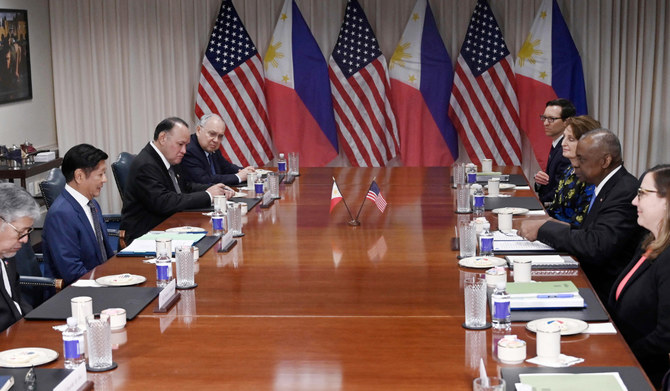
- “The Philippines has no plans to create any more bases or give access to any more bases,” Marcos said, without elaborating in response to a question during a forum with Manila-based foreign correspondents
MANILA, Philippines: The Philippine president said Monday his administration has no plan to give the United States access to more Philippine military bases and stressed that the American military’s presence in several camps and sites so far was sparked by China’s aggressive actions in the disputed South China Sea.
President Ferdinand Marcos Jr., who took office in 2022, allowed American forces and weapons access to four additional Philippine military bases, bringing to nine the number of sites where US troops can rotate indefinitely under a 2014 agreement.
The Biden administration has been strengthening an arc of security alliances in the region to better counter China, a move that dovetails with Philippine efforts to shore up its external defense, especially in the South China Sea.
Marcos’ decision last year alarmed China because two of the new sites were located just across from Taiwan and southern China. Beijing accused the Philippines of providing American forces with staging grounds, which could be used to undermine its security.
“The Philippines has no plans to create any more bases or give access to any more bases,” Marcos said, without elaborating in response to a question during a forum with Manila-based foreign correspondents.
Asked if he was concerned that allowing the US military access to Philippine bases had provoked Chinese actions in the South China Sea, Marcos said the presence of US troops was in response to China’s moves.
“These are reactions to what has happened in the South China Sea, to the aggressive actions that we have had to deal with,” he said, mentioning Chinese coast guard vessels using water cannons and lasers to deter Philippine ships from the area Beijing claims as its own.
He also mentioned collisions, blocking of Filipino fishermen and sea barriers to block ships from Scarborough Shoal, which lies in the Philippine economic zone.
Under Marcos, the Philippines has adopted a strategy of publicizing the incidents by allowing journalists to board its patrol ships to witness China’s assertive actions.
“It is crucial that the media … continue to expose these actions that not only threaten the peace and stability of the region but also undermine the rules-based order that has underpinned global development and prosperity over the previous century,” Marcos said.
China has blamed the Philippines for sparking the confrontations by intruding into what it says were Chinese territorial waters and reneging on an alleged agreement to pull away an old Philippine navy ship, which now serves as Manila’s territorial outpost in the disputed Second Thomas Shoal.
Marcos said he was not aware of any such deal, and added that he considers the deal rescinded — if it ever existed.
Last week, President Joe Biden renewed Washington’s “ironclad” commitment to defend Pacific allies in a summit with Marcos and Japanese Prime Minister Fumio Kishida at the White House. He reiterated that the US is obligated to defend the Philippines if its forces, aircraft or ships come under an armed attack.
Asked when the 1951 Mutual Defense Treaty between the US and the Philippines could be invoked amid territorial hostilities between China and the Philippines, Marcos cited Defense Secretary Lloyd Austin as saying that could happen “if any Filipino serviceman is killed on an attack from any foreign power.”



